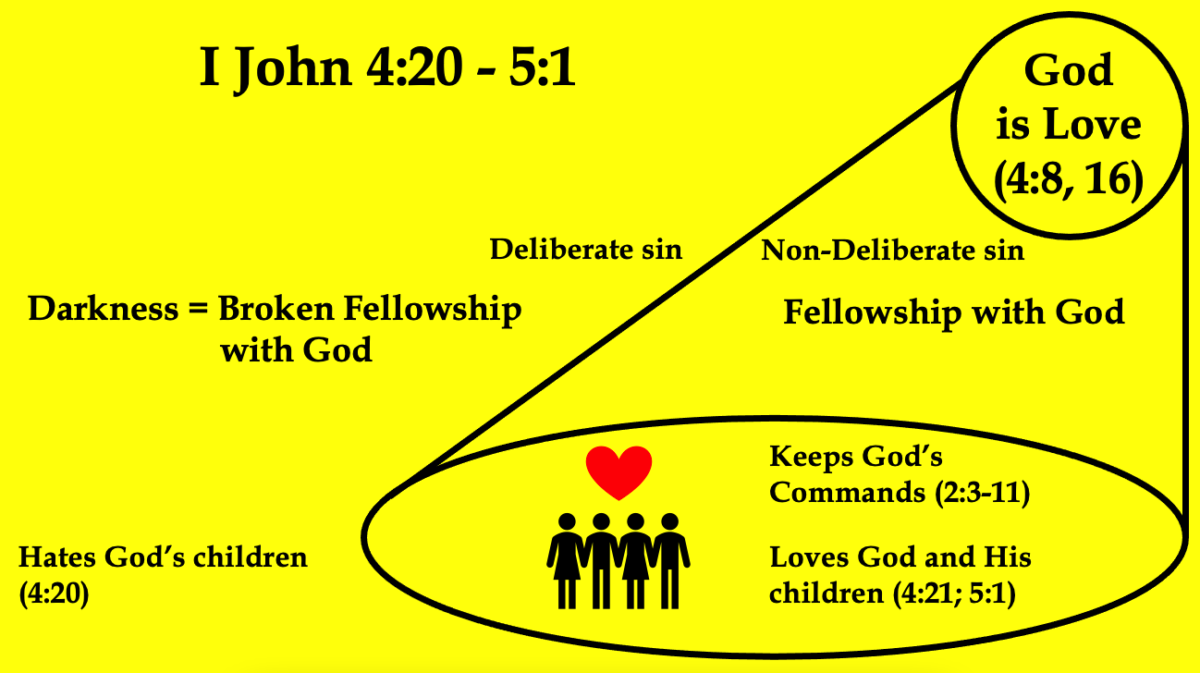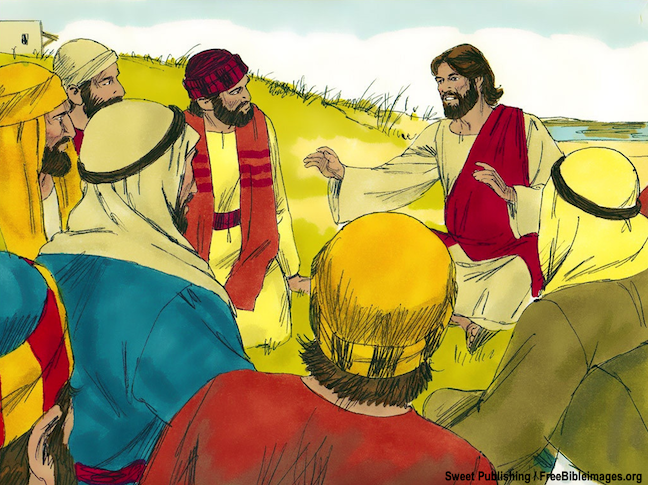“4For whatever is born of God overcomes the world. And this is the victory that has overcome the world — your faith. 5 Who is he who overcomes the world, but he who believes that Jesus is the Son of God?” I John 5:4-5
In the book of I John, the apostle John has made it clear that love is more than mere sentiment or words; it is an act of obedience (I John 2:3-11; 3:10b-23; 4:7-16). Love (agapē) is doing what is best for another person. Christ did what was best for us when He came to earth and died in our place on a cross to pay the full penalty for our sins so whoever believes in Him may have everlasting life (3:16; 4:9-10; 5:13).Hence, if a believer claims to love God Whom he has not seen and hates his Christian brother whom he has seen, he is a liar and is deceiving himself (4:20). God’s commandment to love has interwoven loving Him and loving His children (4:21). We cannot disconnect them.
John anticipated his readers asking, “Who then is my Christian brother or sister?” John identified one’s Christian brother or sister as, “Whoever believes that Jesus is the Christ is born of God…” (5:1a). There is no mention of one’s good works, lifestyle, or obedience. Only believing that “Jesus is the Christ,” the promised Messiah-God (2:22-23; 4:2-3; 5:20; cf. John 11:25-27; 20:31; Isaiah 9:6-7), results in being “born of God.” John then explains that our love for God’s children is not based on their lifestyle or performance, but on our love for the Father of these children (5:1b). If we love God the Father, then we must love His children.
Someone may then ask, “How do I know when I am loving God’s children?” John replies, “By this we know that we love the children of God, when we love God and keep His commandments.” (I John 5:2). Christians can know they are loving God’s children when they “love God and keep His commandments.” Keeping God’s “commandments” is the way to show that a believer loves his brother, since loving a fellow believer is one of those commandments. 1
A Christian is not an only child in the family of God. To ignore a brother in Christ is to cut ourselves off from intimacy with God. 2 God created us for relationships. He never intended for His children to live the Christian life all alone. He meant for us to live life in close fellowship with Him and other believers in Jesus.
In 5:2, it is important to observe that John has moved from keeping God’s single “commandment” (3:23; 4:21), a reference to loving our Christian brothers and sisters, to keeping His “commandments” (plural). 3
“Even if we think of the ten commandments, the last six deal with loving other people. You’ve heard it said to fathers, ‘The best way to love a child is to love his/her mother.’ It is loving other believers when we model the Christian life for them. This is even more important than meeting their physical needs; it points them toward the kind of life that can meet their spiritual needs.” 4
A Christian’s love for other believers can be measured by the degree to which he or she keeps the commandments of God. This may sound like John is putting us under performance, legalism, and relativism (our obedience compared to other Christians around me). But this is not the case. 5
John explains what it means to love God when he writes, “For this is the love of God, that we keep His commandments. And His commandments are not burdensome.” (I John 5:3). The phrase “the love of God” (hē agapē tou Theou) refers to our love for God (objective genitive), not God’s love for us (subjective genitive). 6 Our love for God is measured by the degree to which we “keep His commandments.”
According to the Pharisees, there were at least 613 commandments the Jews were responsible to obey. And in the Sermon on the Mount, Jesus raised the bar even more when He said, “Unless your righteousness exceeds the righteousness of the scribes and Pharisees, you will by no means enter the kingdom of heaven.” (Matt. 5:20). Christ’s audience were taught it was wrong to murder someone (5:21), but Jesus went further when He stated it was sinful to be, “angry with his brother without a cause” (Matt. 5:22). Jesus’ listeners had been taught it was wrong to commit adultery (5:27), but Jesus took it further when He said, “whoever looks at a woman to lust for her has already committed adultery with her in his heart.” (Matt. 5:28). Christ’s audience had heard they were to love their neighbor and hate their enemies (5:43), but now Jesus says, “love your enemies, bless those who curse you, do good to those who hate you, and pray for those who spitefully use you and persecute you” (Matt. 5:44). Christ took the interpretation the Pharisees had given of the Law and took it to a whole other level. 7
All of this may sound overwhelming to us. You may be saying to yourself, “How can I keep God’s commandments? It seems too difficult. It is beyond my reach. It is impossible!”
John responds by saying that God’s “commandments are not burdensome” (I John 5:3b). What does he mean by this? The word translated “burdensome” (barus) means to be “heavy, oppressive, unbearable, or weighty.” 8 If we try to live up to the standards of God’s Law in our own strength, we will experience an overwhelming weight of oppression and defeat. There will be no joy or peace in our lives.
The issue here is the source for keeping God’s commandments, not the standard of God’s commandments themselves. John explains why God’s commandments are not burdensome when he writes, “For whatever is born of God overcomes the world. And this is the victory that has overcome the world—your faith.” (I John 5:4). The word translated “For” (hoti) means “because.” 9 Hence, I John 5:3b-5:4a would read, “And His commandments are not burdensome because whatever is born of God overcomes the world.”
Since we are talking about people, we would expect this to say, “Whoever is born of God.” But instead, it says, “whatever [pan] is born of God.” The phrase “is born” (gegennēmenon) translates a perfect tense participle. The Greek perfect tense refers to a completed action in the past with continuing results to the present. Our new birth was completed in the past but has a continuing impact on us to the present. This is very significant.
John is emphasizing our ultimate source of victory over the world which he identifies in the last half of verse 4: “And this is the victory that has overcome the world—your faith.“ (I John 5:4b). The word translated “faith” (pistis) is a singular neuter gender. This connects back to the singular neuter genders in this verse: “whatever” (pan), “born of” (gegennēmenon), and “this” (hautē). Our single act of “faith” in Christ alone for new birth (“born of God”) is the source of our permanent victory over the world system which was satanically opposed to us being born into God’s family (5:4b) and is satanically blinded to the gospel (2 Cor. 4:3-4).
“What the Apostle clearly wishes to affirm in 1 John is that the very act of believing in Christ is a singular—and permanent—victory over the unbelieving world around us. Moreover, this victory is the reason why obedience to God’s commands is not a burden to the believer (1 John 5:3-4; see Matt 11:28-30).” 10
Before we became Christians, Satan used the world system to oppose us from being born into God’s family. This is why John writes, “Who is he who overcomes the world, but he who believes that Jesus is the Son of God?” (I John 5:5). The moment an unsaved person believes that Jesus is the Son of God, he overcomes the world which did all it could to keep him or her from believing this truth for salvation. Since the antichrists or false teachers deny “that Jesus is the Christ” (I John 2:22), it is a great victory when a person believes this truth and is born into God’s forever family.
Satan is actively engaged in blinding people’s minds to prevent them from believing in the gospel of God’s Son (2 Cor. 4:3-6; 11:3-4; Ephes. 2:2). He uses the world system including educational systems, various religions, economical systems, political systems, entertainment, and recreational systems to name a few, that teach many false views which desensitize people to their urgent need for a Savior including such things as:
- Humanity is basically good, so people do not need to be saved from sin.
- Since God is love, all people will go to heaven.
- Jesus was just a good moral teacher or prophet who provided a good example to follow.
- God and the Bible cannot be trusted.
- Sin has no consequences.
- God does not exist.
- You can decide tomorrow.
But when God breaks through these (and other) lies and a lost sinner “believes that Jesus is the Son of God” to be “born of God” (I John 5:4-5), then Satan is directly defeated. And since the effects of new birth can never be reversed by Satan, this defeat is decisive and permanent (Luke 8:12; Col. 2:15).
However, this initial victory does not guarantee victory in living the Christian life. Rather, the victory achieved by the new birth makes obedience to God’s commands an achievable goal. The Greek constructions in I John 5:4 translated “he who overcomes” (ho nikōn) and “he who believes” (ho pisteuōn) are present participles preceded by the Greek article. 11
“This construction in Greek is essentially timeless and characterizes an individual (or individuals) by some act or acts he has (or they have) performed. Such statements have their closest analogy to many English nouns (often ending in–er) that express completed and/or ongoing action. For example, ‘He is a murderer.’ In this case the person may be described this way based on one instance of murder or because of many such acts.
“John is thus saying that ‘the overcomer of the world’ is one and the same as ‘the believer in Jesus Christ, God’s Son.’ As is made clear by the past tense of verse 4 (‘has overcome’) this is already true! But since John is discussing the fact that keeping God’s commandments is not ‘burdensome’ (5:3b), the implication is that such victory can continue and that the key to it is faith! Just as the Christian life begins at the moment of saving faith in Christ, so also that life is lived by faith in Him.” 12
“With these words, the writer affirmed that a believer is a world-conqueror by means of his faith in Christ. This suggests that such faith is the secret of his continuing victory and, for that reason, obedience to God’s commands need not be burdensome.” 13
“If your Christian life is weighing you down, you’re not living the real Christian life. How do I know? Because God’s commands are not a burden. When obedience is driven by love, it loses its burden. Ask any mother of a newborn. A mother doesn’t feed, change, clean, and comfort her baby because of a command—but because of love. Does she become tired and dirty? Of course. But the work isn’t a burden per se because it’s her baby she’s attending. When you love others based on your love for Jesus, He says in effect, ‘Hitch up to me, and I’ll do the pulling’” (Matt 11:30).” 14
Since our first victory (new birth) was by faith in Christ (5:1, 4-5), then it is by faith in Christ that we may continue to experience victory in the Christian life. Since Christ was our Substitute in death; He must also be our Substitute in life. This is what the apostle Paul was trying to say when he wrote, 15 “I have been crucified with Christ; it is no longer I who live, but Christ lives in me; and the life which I now live in the flesh I live by faith in the Son of God, who loved me and gave Himself for me.” (Gal. 2:20; cf. Rom. 5:10).
“It has been said that the hardest thing in the world for a non-Christian to believe is in the substitutionary death of Christ, but the hardest thing in the world for a Christian to believe is in the substitutionary life of Christ. We got victory over death by His death; we shall have victory in life by His life. This is what it means when it says, ‘Christ lives in me.’” 16
Prayer: Gracious Father in heaven, thank You for saving us from eternal death the moment we believed in Jesus and His substitutionary death for all our sins. This single act of faith in Christ overcame Satan and his world system which had blinded us to the gospel and opposed us from being born into Your forever family. Since this first victory was by faith in Christ, we cannot continue to experience victory in our Christian lives apart from faith in Jesus and His substitutionary life. When our faith is in Christ, keeping His commandments is not burdensome because Jesus is our source of power. Thank You Lord Jesus for living in and through us. Please use us to share this life-changing message with those who are blinded to the gospel so they may experience permanent victory over the Devil and his world system. In the matchless name of Jesus Christ, we pray. Amen.
ENDNOTES:
1. See Zane C. Hodges; Robert Wilkin; J. Bond; Gary Derickson; Brad Doskocil; Dwight Hunt; Shawn Leach; The Grace New Testament Commentary: Revised Edition (Grace Evangelical Society, Kindle Edition, 2019), pp. 601.
2. Tony Evans, CSB Bibles by Holman, The Tony Evans Bible Commentary (B & H Publishing Group, Kindle Edition, 2019), pg. 2950.
3. Hodges, The Grace New Testament Commentary, pg. 602.
4. David R. Anderson, Maximum Joy: I John – Relationship or Fellowship? (Grace Theology Press, 2013 Kindle Edition), pp. 227-228.
5. Ibid., pg. 228.
6. Archibald Thomas Robertson, A. T. Robertson’s Word Pictures in the New Testament [with Bible and Strong’s Numbers Added!], 6 Volumes (E4 Group, 2014 Kindle Edition), Kindle Location 207464; cf. Tom Constable, Dr. Constable’s Notes on 1 John, 2022 Edition, pg. 107; Hodges, The Grace New Testament Commentary, pg. 602.
7. Anderson, Maximum Joy, pg. 228.
8. Walter Bauer, A Greek-English Lexicon of the New Testament and Other Early Christian Literature: Third Edition (BDAG) revised and edited by Frederick William Danker (Chicago: University of Chicago Press, 2000 Kindle Edition), pp. 167-168.
9. Robertson, A. T. Robertson’s Word Pictures in the New Testament, Kindle Location 207484; Hodges, The Grace New Testament Commentary, pg. 602.
10. Zane C. Hodges, Grace in Eclipse: A Study on Eternal Rewards (Grace Evangelical Society, Kindle Edition, 2016), pg. 152.
11. Hodges, The Grace New Testament Commentary, pg. 602.
12. Ibid.
13. Zane C. Hodges, The Bible Knowledge Commentary Epistles and Prophecy, Editors John F. Walvoord and Roy B. Zuck (David C. Cook, 2018 Kindle Edition), Kindle Location 4043 to 4048.
14. Evans, The Tony Evans Bible Commentary, pg. 2950.
15. Anderson, Maximum Joy, pg. 229.
16. Ibid., pg. 230.













